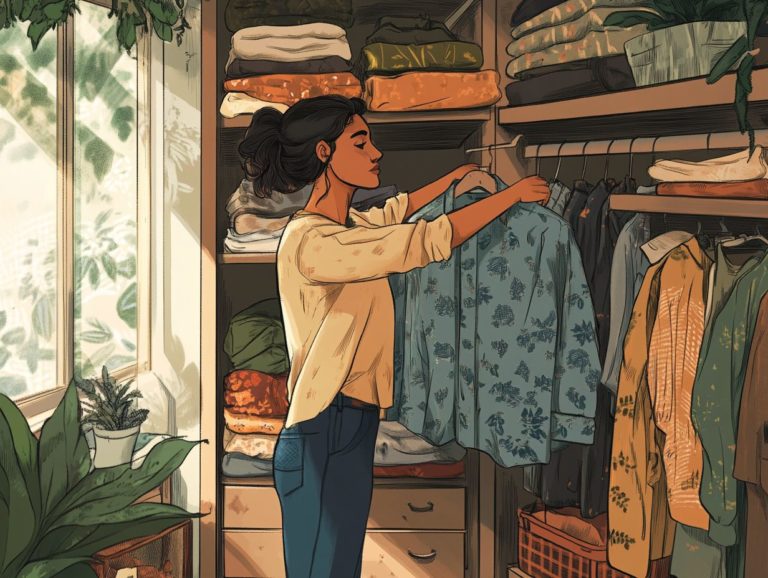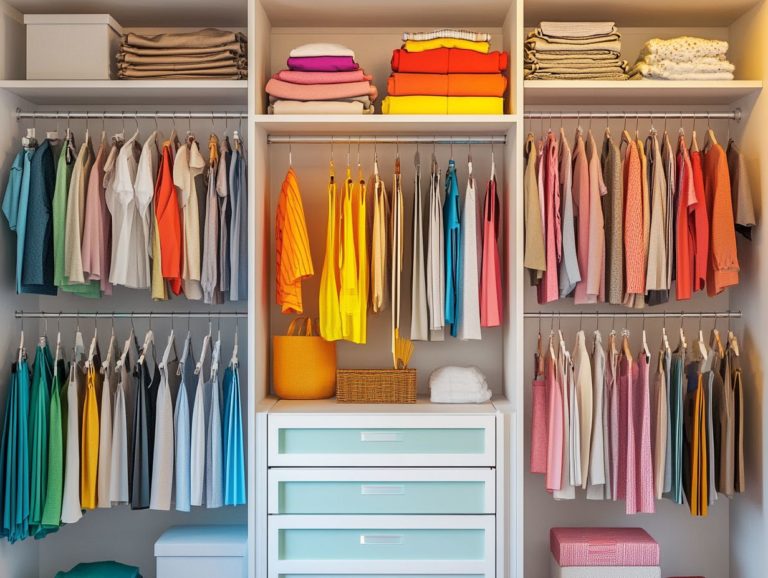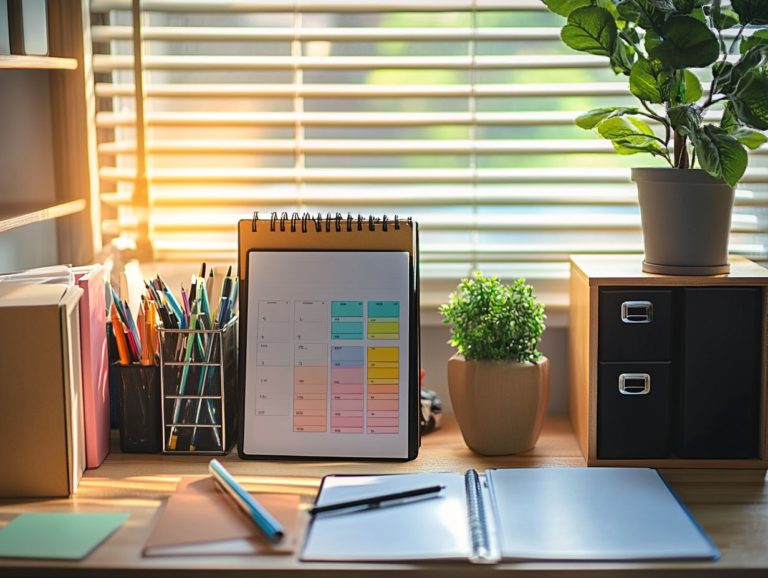The Psychology Behind Closet Clutter
Feeling overwhelmed by your clutter? You re not alone! Clutter isn t just an eyesore; it can deeply affect your mental health and daily life.
This article explores how clutter influences emotions and relationships, highlighting the psychological effects of disorganization and nuances of hoarding behaviors.
You’ll discover practical strategies for decluttering and maintaining an orderly environment. Take action now to reclaim your space and enhance your well-being!
Join us as we explore the vital connection between your surroundings and mental clarity.
Contents
- Key Takeaways:
- The Impact of Clutter on Mental Health
- Understanding the Psychology of Hoarding
- How Clutter Affects Daily Life
- Strategies for Decluttering and Organizing
- Maintaining a Clutter-Free Space
- Frequently Asked Questions
- What is the psychology behind closet clutter?
- Why do some people struggle with keeping their closet organized?
- What are the effects of closet clutter on mental health?
- How can decluttering a closet improve one’s mental well-being and emotional attachments?
- What are some tips for overcoming the psychological barriers to decluttering a closet?
- Is there a connection between closet clutter and hoarding disorder?
Key Takeaways:
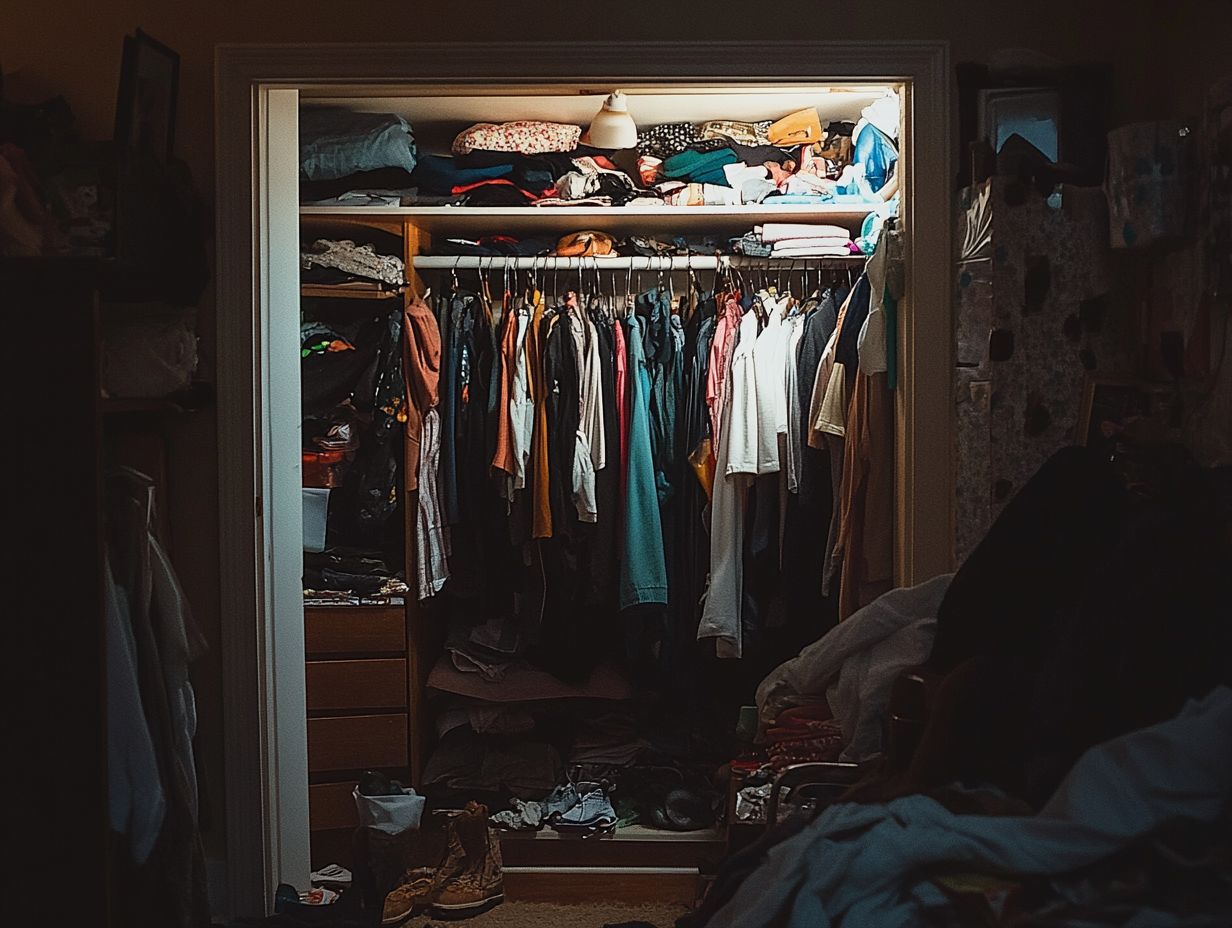
- Clutter can increase stress and anxiety.
- Hoarding often stems from emotional issues.
- A messy space can hurt relationships and productivity.
The Impact of Clutter on Mental Health
The impact of clutter on mental health can be profound. Disorganization creates physical distractions and significantly contributes to stress-related illnesses and emotional turmoil.
Research indicates that clutter worsens mental health problems, affecting your emotional well-being and leading to chaotic living spaces. It s crucial to grasp the psychological aspects that underpin these effects.
Research Findings and Studies
Numerous studies reveal a strong connection between disorganized spaces and mental distress. You often experience heightened stress and anxiety when in chaotic environments.
One study found that people in cluttered homes reported lower overall life satisfaction. Another looked at how excessive items lead to cognitive overload, hindering focus and productivity, which increases emotional strain.
The implications of these findings are significant. Maintaining organized spaces can elevate your mood and serve as an effective coping mechanism. By understanding these challenges, you can implement behavioral changes that foster a healthier mental state.
Understanding the Psychology of Hoarding
To understand hoarding, we need to look at the deep emotional ties people have to their belongings. This behavior creates substantial mental barriers and can lead to considerable distress.
Causes and Triggers
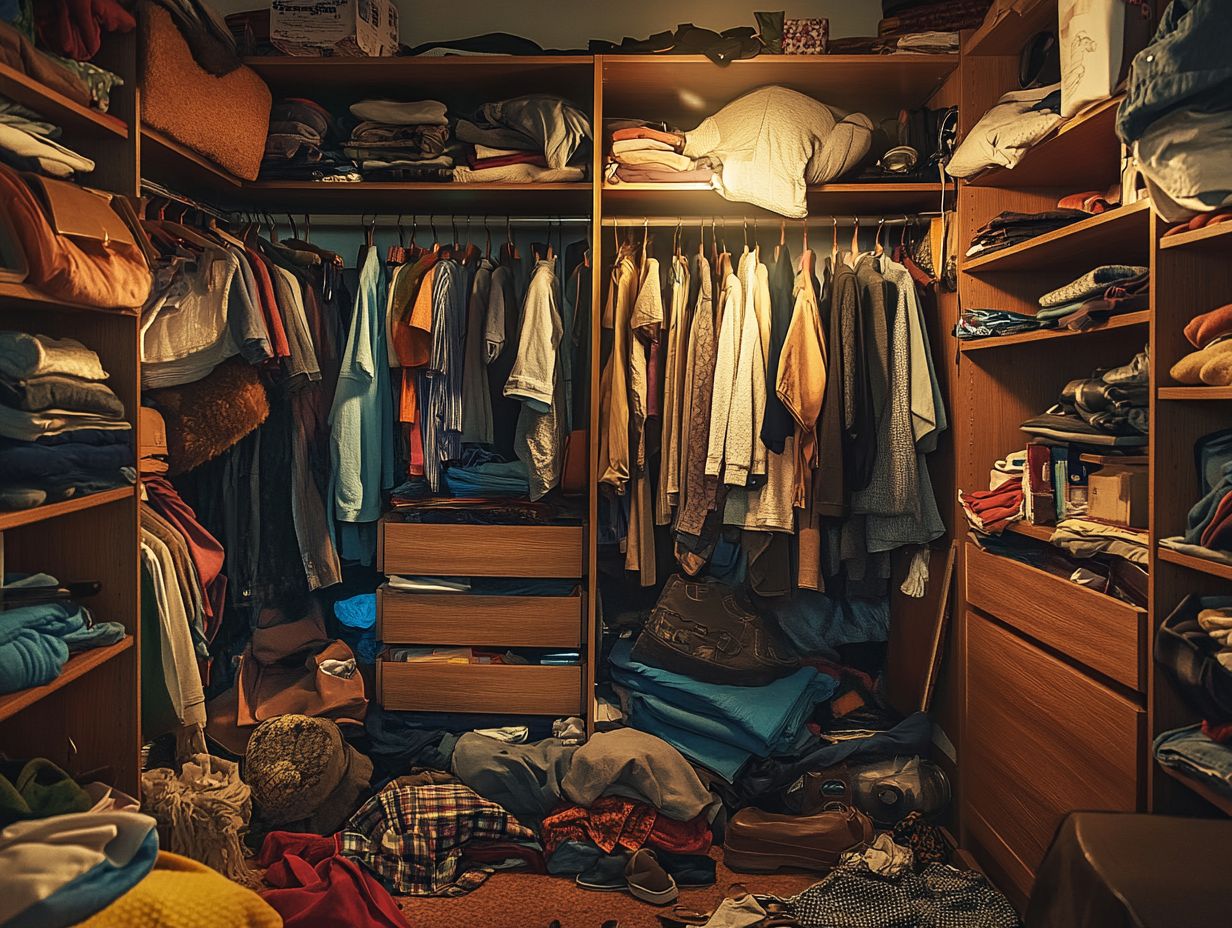
The causes of hoarding behavior often stem from emotional healing processes, family dynamics, and significant past experiences that shape attitudes toward possessions.
Understanding these influences reveals why some individuals develop overwhelming attachments to items, seeing them as extensions of themselves. Emotional distress from loss or trauma can intensify this behavior, turning collecting into a coping mechanism.
Family dynamics also play a critical role, especially when childhood environments prioritize material accumulation over emotional needs. By examining these factors, you can tailor interventions to address the unique challenges you face.
How Clutter Affects Daily Life
Clutter profoundly impacts your daily life by disrupting relationships, hindering productivity, and increasing stress levels. This creates a cycle that can be challenging to break.
Take the first step toward decluttering today and support your journey toward emotional recovery.
Relationships, Productivity, and Stress
Clutter can strain your relationships and diminish your productivity. It creates an environment filled with distractions and stress.
When your space is overwhelmed with disorganized items, frustration and disagreements can easily arise among those living or working together. This disarray diverts your attention from essential tasks, cultivating an atmosphere of chaos where communication falters under the weight of underlying tension.
To tackle these issues, adopting simple organizing solutions is essential. Implementing strategies such as:
- Decluttering regularly,
- Establishing designated spaces for your belongings,
- Leveraging effective storage solutions,
will instantly transform your space into a cozy retreat! In turn, this fosters clearer communication and boosts your overall well-being, paving the way for both personal and professional success.
Strategies for Decluttering and Organizing
To effectively declutter and organize, you need to grasp the psychological nuances of clutter. Embracing practical solutions can transform chaotic environments into serene, enjoyable living spaces.
Understanding the relationship between your mindset and your surroundings is key to achieving a harmonious and organized home.
Practical Tips and Techniques
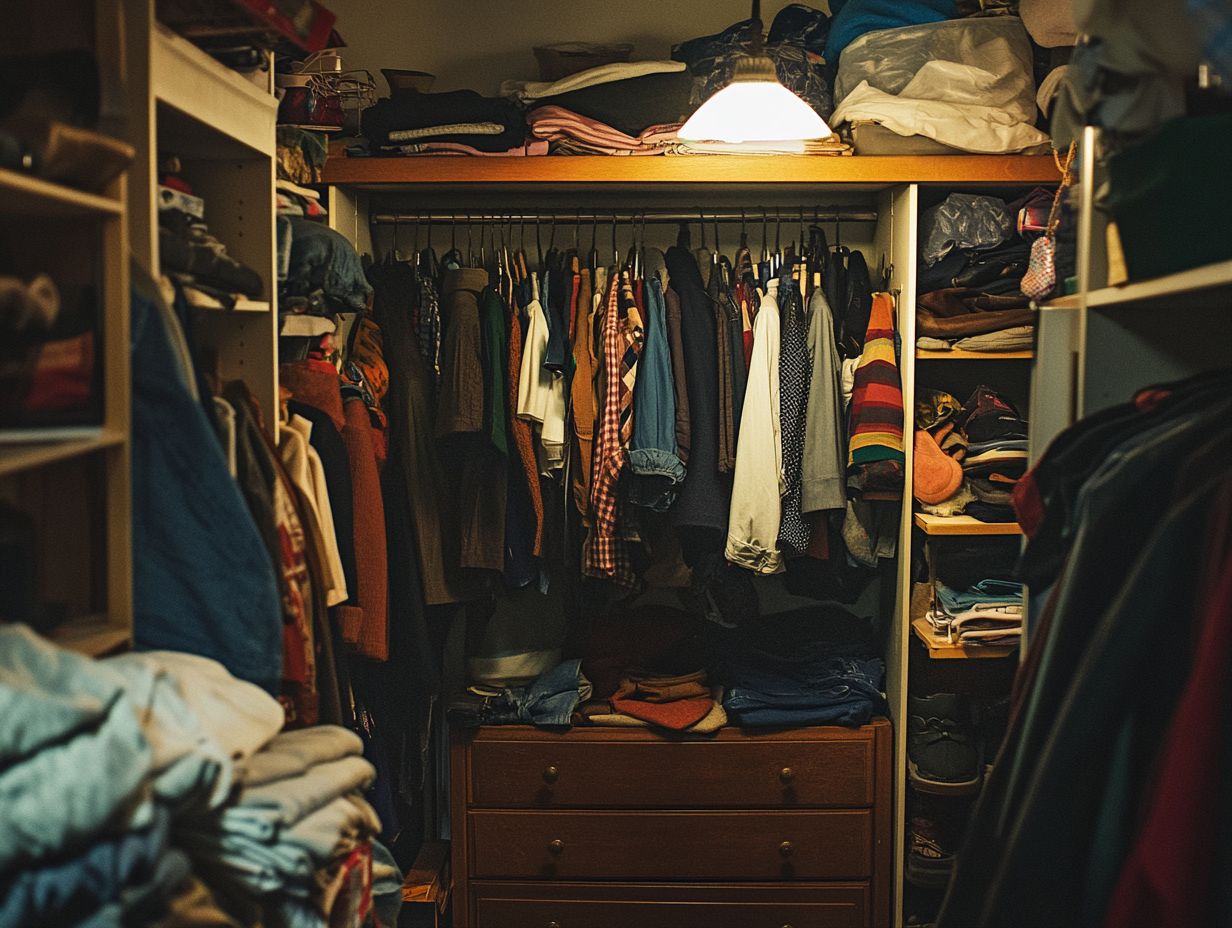
Implementing practical tips and techniques for decluttering can lead to a remarkable reduction in clutter. This transforms your space into a haven of organization.
By utilizing specific organizing tools think storage bins, drawer dividers, and label makers you can designate areas for your belongings. This not only enhances visibility but also simplifies the retrieval process, making life just a bit easier.
Embracing habits like the one-in-one-out rule is essential. For every new item that enters your space, an old one should find its way out, maintaining a harmonious balance.
Breaking tasks into smaller, manageable segments helps you avoid feeling overwhelmed. Prioritizing regular maintenance routines ensures that clutter stays at bay.
With these strategies in place, you can cultivate a serene and organized environment that truly reflects your lifestyle.
Maintaining a Clutter-Free Space
Maintaining a clutter-free space is crucial for your long-term emotional well-being. It involves cultivating specific habits and practices that foster an organized environment.
Embrace these strategies to create your sanctuary today!
Habits for Sustaining a Tidy Environment
Developing effective habits for maintaining a tidy environment can truly transform organized chaos into a consistent state of order and clarity.
By fostering a sense of teamwork and accountability among family members, you can create an atmosphere where everyone feels invested in keeping things clean.
For instance, setting aside specific days for decluttering can help you establish a routine that eventually becomes second nature.
Involving everyone in the decision-making process not only enables them but also strengthens bonds. This ensures that the commitment to an organized space is a shared responsibility.
As your family learns to designate items, develop a place for everything, and establish daily maintenance rituals together, you cultivate a culture of respect for your living environment. This turns it into a haven of order.
Frequently Asked Questions
What is the psychology behind closet clutter?
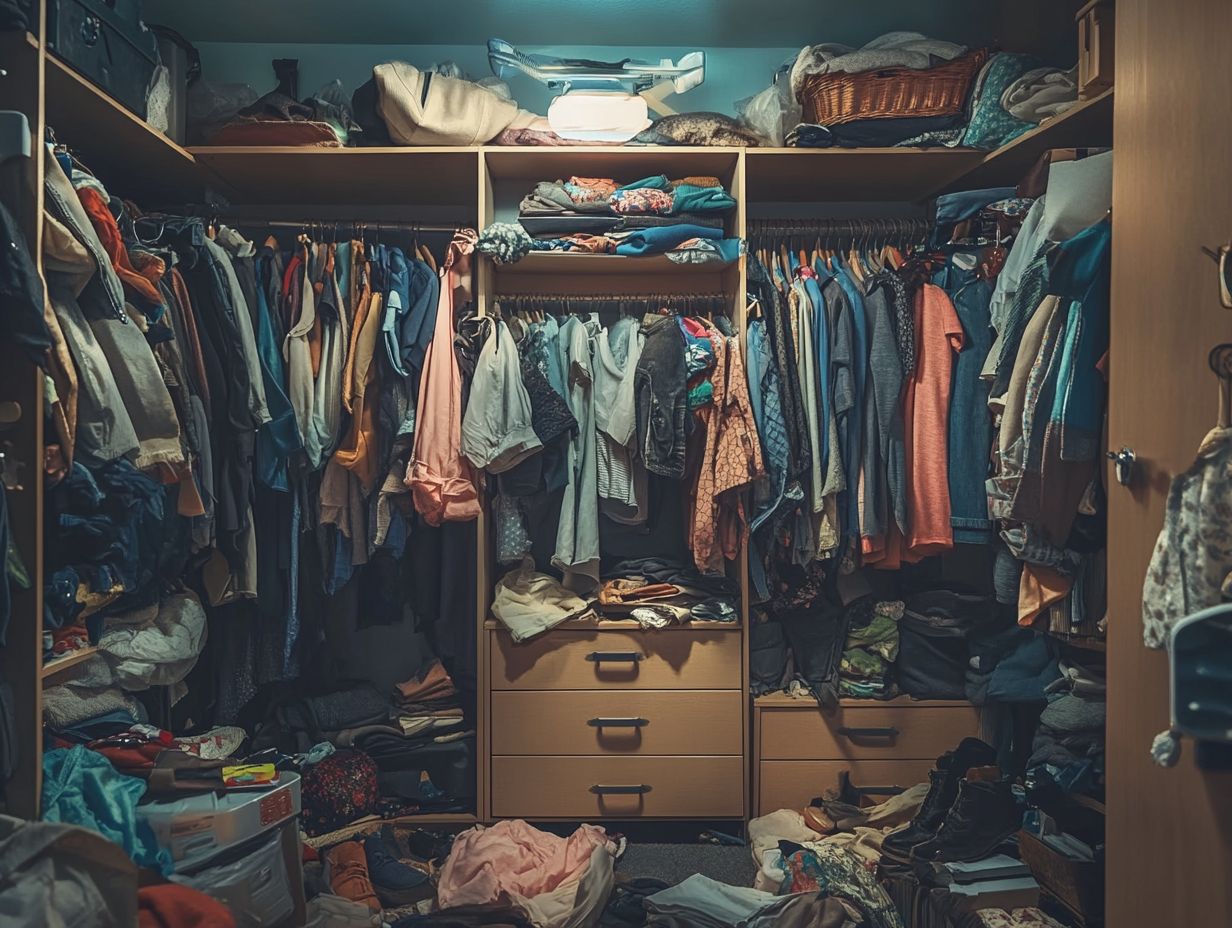
The psychology behind closet clutter is a complex mixture of emotional attachment, fear, and procrastination. It is often linked to underlying psychological issues such as anxiety, depression, and perfectionism.
Why do some people struggle with keeping their closet organized?
Some people struggle with keeping their closet organized because they attach emotional value to their belongings. This makes it difficult to part with them.
Others may have a fear of throwing away something they might need in the future. Procrastination can also play a role, as it can be overwhelming to tackle a large cluttered space.
What are the effects of closet clutter on mental health?
Closet clutter can have a negative impact on mental health. It can cause feelings of stress, anxiety, and overwhelm. The constant visual reminder of a cluttered space can also lead to a decrease in motivation and productivity.
How can decluttering a closet improve one’s mental well-being and emotional attachments?
Decluttering a closet can improve mental well-being in several ways. It reduces stress and anxiety by creating a more organized and visually appealing space. It also increases motivation and productivity by removing the visual distraction of clutter.
Decluttering creates a sense of accomplishment and control over one s environment.
What are some tips for overcoming the psychological barriers to decluttering a closet?
Family dynamics can play a significant role in clutter management. Family participation is essential for effective organizing.
Engaging in spring cleaning can be a valuable coping mechanism to tackle both physical and digital clutter. The goal is to transform your space into a joyful haven while focusing on emotional well-being over collecting habits.
A life coach might suggest embracing minimalism and developing effective clutter reduction strategies to alleviate stress-related issues. Understanding the emotional aspects of decluttering can help in this journey. Utilizing various organizing tools and decluttering techniques can make the process enjoyable.
In the decluttering journey, many find that shifting from chaotic to calm living spaces enhances their emotional well-being and contributes to emotional healing. It’s important to recognize how distractions from clutter can stem from past experiences or societal expectations that influence decision-making. Embracing the role of mindfulness in closet decluttering can further support this transformative process.
Some tips for overcoming psychological barriers to decluttering a closet include setting small, achievable goals, using a timer to limit overwhelm, and seeking support from friends or a professional organizer. It can also be helpful to understand the role of color in closet decluttering and to identify and challenge any negative thoughts or emotions that may be keeping you from decluttering.
Is there a connection between closet clutter and hoarding disorder?
There is a connection between closet clutter and hoarding disorder. Hoarding disorder is a more extreme version of closet clutter, where individuals struggle to discard items, regardless of their value or usefulness.
Hoarding disorder is a recognized mental health condition that requires professional treatment, while closet clutter can be managed with self-help techniques.




